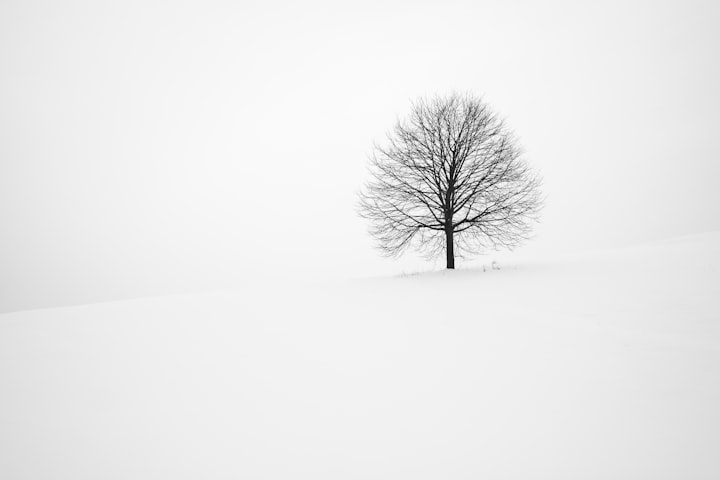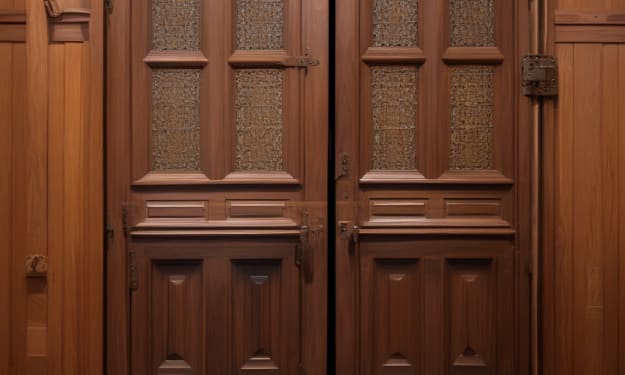wild pear
dark secrets and hidden madness

It never bore fruit. She said it had been struck by lightning, but we all knew that was a lie. My great-aunt’s garden was full of lies, as was her house, from attic to cellar; as were her body, her mind, and her soul. Lies, manipulations, orchestrations, and power-plays: these were the only things she knew. Her garden was completely empty, except for that one wild pear tree, standing alone, only touched by lightning from the storms of great-aunt Evelyn’s imagination. There were no other plants or flowers, no shrubs, no other trees. Barely even any grass, really. Three fences, one house wall, and that solitary pear tree, made up the area we called the garden, in which I spent many hours of my childhood with my cousins. Beyond that house, there were jokes that nothing could grow in her garden because she had made the ground itself so bitter, only the barren tree was hardy enough to cling to its minimalist survival in a Machiavellian microclimate.
We only believed it to be a pear tree because that’s what she always called it, but I know I never checked it, and it was doubtful anyone else ever questioned it. There were never any flowers or fruits on it, so really, it could have been anything at all, just an anonymous tree in an angry old lady’s back yard. The children in the street whispered stories about her, and the house in which she lived alone, for as long as I could remember. Every year, as summer gave way to autumn, she would present a bone china platter of picture-perfect pears upon her dining table, a highly polished, bright, solid silver apple corer by their side, and we would all pretend with our well-practiced English politeness that they had been harvested from the twisted arboreal skeleton lurking behind the house. Nobody else I knew cored pears the way she did; the ceremony felt strange, forced, and uncomfortable.
The attic windows were covered by an aggressive creeping plant whose name I could never quite remember, and it sprawled the windows of a room I had never seen from the inside of the house. There were more locks in her house than seemed either necessary, or possible. The doors that could not be opened outnumbered the ones that permitted entry, but it was never a subject we broached in conversation. Even as young children, curiousness was discouraged, and an inquisitive nature was interpreted as rudeness. We were to play outdoors, or not at all. Any misstep in behaviour would see any, or all, of us, sent home; a brief flurry of rage, followed by instant banishment.
It had been many years since I had last visited the house. She had died on my thirtieth birthday and her image haunted my dreams for a week. I hadn’t seen her for over a decade but, even in my subconscious, I could feel the visceral burn of her eyes boring into me, as if no time had passed at all. Nobody knew why she had left the arrangements in the way that she did, with odd inheritances – many seemingly paltry - scattered here and there, and, certainly, I had no idea why I had been chosen as the executor of the will. Bound by duty, I collected the inordinately large set of keys, and returned to that dark house from my past, to find almost nothing had changed at all.
The creeper still clawed at the glass of the upper floors, and the neighbours still whispered from across the street. The house was to be sold, following my visit, and the subsequent clearance; the will had been vague, but her wishes had been clearer. She had instructed me to go alone to the house, and to seek out an envelope in the kitchen, under the pear platter. The large china serving plate sat grandly upon a dresser as if still patiently waiting for the coming of next autumn; she had left that to one of my cousins, while the antique silver corer was bequeathed to me. I had not yet happened upon the corer by that point, but there were many rooms still to come. I could not pretend I was not intrigued. Not only had my great-aunt left for me the silver heirloom, but also all the contents of all the locked rooms. Of course, my cousins convinced themselves they were about to be cheated out of a thousand treasures, but all their envy and confusion spiralled from the simple fact there was not one living soul within our family who had ever seen behind those doors.
It was unsurprising to me that there was a thick layer of dust across most of the furniture. Nothing had been disturbed, or rearranged, since her death, but it was also clear that no deep cleansing or redecorating had occurred for as long as I could remember. What little light came through the windows only served to illuminate shafts of airborne filth: sombre, mournful, floating particles of forgotten moments from a dead woman’s life. All around, stale echoes of the past wrapped their fingers around the present’s neck. Even the envelope coughed up its own detritus, and, with its glue no longer stuck, I pulled out the note and read it aloud to the grimy darkness.
Elizabeth, What you find will likely shock you, but I ask you, please try to understand. Sometimes endings are beginnings, but sometimes those endings must be forged in fire. Most of the rooms are empty because I could not bring myself to exist there. Please water the pear tree one last time for me . Yours, Evelyn
It wasn’t the answer to thirty years of questions, nor was it the treasure map I had expected. I tucked it into my bag and pressed on, with the keys in my hand weighing heavier with every moment.
Each lock had a unique key, and she was right, room after room was dusty, empty, forgotten, like a haunted house so dull that even the bored ghosts had chosen to leave. My heart in my mouth every time I turned another key, click, disappointment. Room after room of bare walls and floorboard, austere, minimal, nothing. It was not long before I reached the attic room. The stairs loomed ominously, as you would expect the portent of a predictable horror film, and I began to imagine escalating music compelling me onwards, threatening camera angles illuminating my fearful path. I could hear my heartbeat in my ears and the nausea rising in my throat. Tears prickled, while perspiration beaded at my lower back. I will never forget just how much I did not want to go up there. The traditional roundness of the doorknob slipped beneath my clammy fingers, and I wanted to scream with the desire for this awful day to be over. It turned, and I pushed the door. There were mice, that was certain, and pigeons, too. Scurrying and scratching, a miniature jungle alive now with hurried movements all around me, surprised for the first time in possibly years. The light was patchy, dappled, green in places. It seemed the creeper had grown to maturity within the eaves, weaving its way through stacks of furniture. Scores of antique pieces, now riddled with woodworm and insects, upholstery in tatters, legs crumbling. Of all the rooms to store these pieces, this was the most nonsensical. The inventory was extensive, and mostly, destroyed, all gradually being reclaimed by the relentless rage of mother nature. At my feet, another, much older, unaddressed envelope lay, a note spilling forth:
Lamps that lit his face, drawers where he kept his clothes, the table at which he would stare as I cowered in the corner. The chairs on which he sat, while he tore apart my soul. The bed in which he raped me. I cannot bear to see these things.
I felt the shiver run through me and I choked on unsettled dust and the lurching in my stomach. If I had felt chilled to the bone on arrival, I was now frozen to the core. How many years to live in such a way, carrying such sadness and pain. The doors had been locked my entire life. I had not cried upon the news of her death, but now hot fire poured through tears of confused grief, and, shaking, I sobbed all the way back to the claustrophobically dark kitchen.
My heart would break if there was to be more of the same in the basement cellar. I thought about calling one of the others to come and hold my hand, but quickly dismissed it. I had to go down there, and she had asked me to do it alone. Turning the key, and then descending the stairs, I felt a tug of recognition, beyond simple psychological fear. I knew this would be the shock spoken of in the first note. I drew my breath and begged my chest to calm its frenzy. The dank air was rotten beyond staleness, and overwhelming. The light was dim, but strong enough to make out another envelope, next to the silver apple corer, on a small table in front of me.
Beyond, what looked, uncomfortably, like a bed.
I picked up the envelope and moved towards the bed. My steps were slow, my breath, held. I did not want to hear my own movement for fear it might make the scene a reality.
The body on the bed was scarred hundreds of times; each scar, small and round, matching all the rest. He was old, had been restrained, and was now decaying into a pointless freedom. I struggled not to vomit as my brain processed the details and I forced myself to focus upon the new note.
I cored him every week for your whole life, Elizabeth. I kept that apple corer sharp to make it easier. Every time I did it, I thought it would make me feel a little less broken. Some days, it did. Most of the time, it just reminded me of all the things which had gone before.
Every week, I would go and bury the little pieces of his flesh under the pear tree, to say thank you. He hanged me there, the winter after you were born. I felt my soul being torn from my body, until the tree gave up her own limb. Never again speak ill of a fruitless tree! She saved me that night.
If I was still breathing, I had become unaware of it. Every sense overwhelmed and my throat filled with fear, implications racing through my horrified mind. The corer caught the light in the corner of my eye, and I fled. I raced up the stairs and through the back door, into the garden, falling to my knees in front of the tree, exploding with adrenaline in every cell.
My hands on her trunk, I walked myself upwards, palm by palm, back onto my feet, looking up through the twists, the knots, and the bark. I drew breath at the space where a great limb had once been, and I exhaled at the ground recently disturbed around her.
All became still, and the only sound was the smallest thud of the tiniest pear as it fell to the earth by my feet.
///thank you for reading this dark nugget! Please heart it if you enjoyed it, or share it with friends who might like it :) ///
About the Creator
Joanna McLoughlin
/// fiction with a dark edge ///
\\\non-fiction on the wellbeing tip\\\
CW/TW for my fiction work: often contains violence and may contain references to trauma/dv/assault






Comments
There are no comments for this story
Be the first to respond and start the conversation.